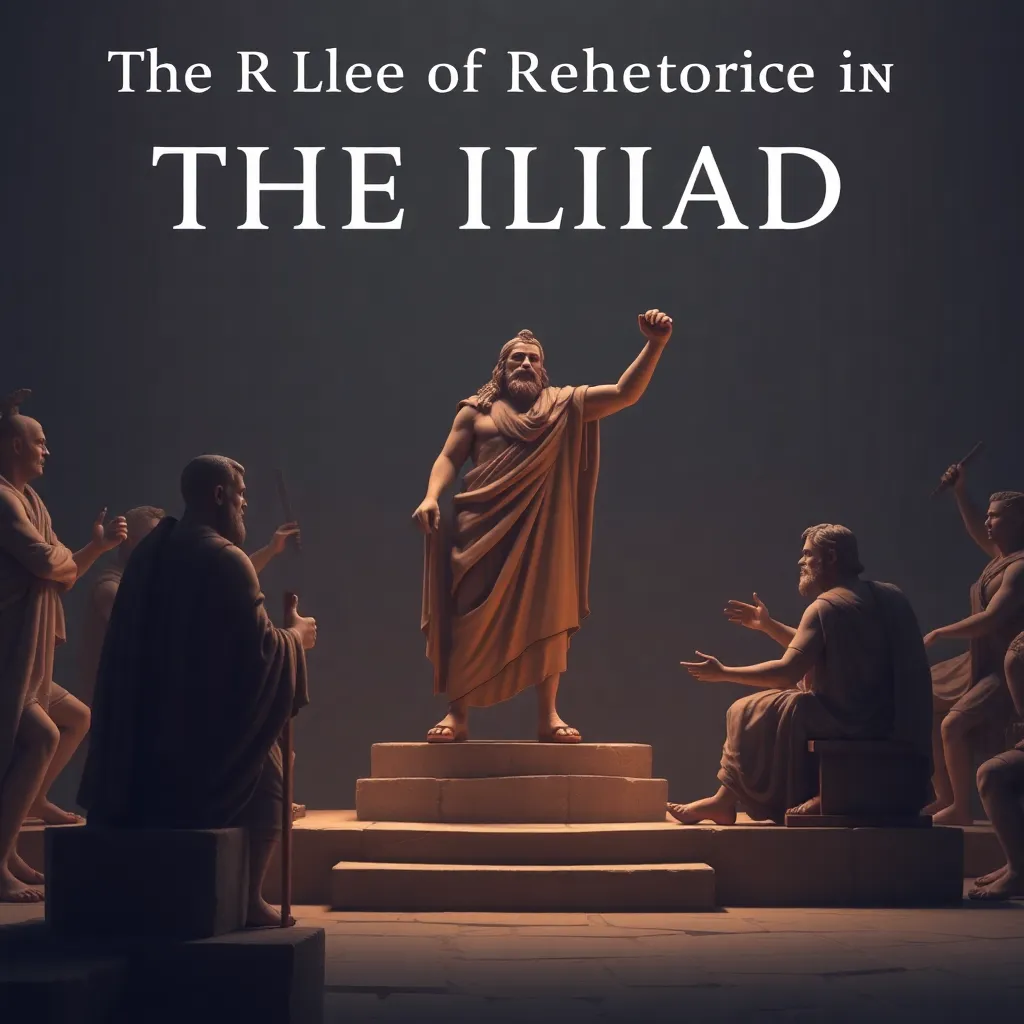The Role of Rhetoric in The Iliad: Speeches and Persuasion
I. Introduction
The Iliad, attributed to the ancient Greek poet Homer, is one of the foundational texts of Western literature. This epic poem not only narrates the events of the Trojan War but also delves deep into the complexities of human emotions, honor, and the consequences of conflict. Central to the narrative are the speeches delivered by various characters, which utilize rhetoric as a means of persuasion and expression.
Rhetoric, the art of effective speaking and writing, held significant importance in ancient Greek culture. It was not merely a tool for communication but a vital skill for leadership, debate, and social interaction. In this article, we will explore how rhetoric shapes character interactions and influences plot development in The Iliad, highlighting its profound impact on the epic’s themes and messages.
II. The Nature of Rhetoric in Ancient Greece
Rhetoric in ancient Greece can be defined as the art of persuasion through speech. It was central to public life, especially in the realms of politics, law, and education. The ability to speak persuasively was highly valued, as it enabled individuals to influence others and assert their views.
Key elements of effective rhetoric include:
- Ethos: Establishing credibility and moral character.
- Pathos: Appealing to the audience’s emotions.
- Logos: Using logical arguments and evidence.
The historical context of rhetoric in Homeric epics reveals that it was not only a technique for persuasion but also a reflection of social hierarchies and interpersonal dynamics. Speeches in The Iliad often serve to highlight the characters’ values and motivations, revealing the intricacies of their relationships.
III. Major Rhetorical Figures in The Iliad
Throughout The Iliad, several key figures utilize rhetoric to convey their ideals and influence others:
- Achilles: The embodiment of personal honor and emotional appeal, Achilles’ speeches often center around themes of rage and pride, showcasing his internal struggles and motivations.
- Agamemnon: As a leader, Agamemnon employs authority and command in his speeches, asserting his power while also facing challenges to his leadership.
- Hector: Hector balances duty and persuasion in his addresses, often reflecting on his responsibilities as a warrior and a family man.
IV. Key Speeches and Their Impact
Certain speeches in The Iliad stand out for their rhetorical power and their profound impact on the narrative:
- Achilles’ Speeches: Achilles’ expressions of rage and honor significantly shape the plot. His refusal to fight following Agamemnon’s slight not only impacts the Greek forces but also illustrates the theme of personal honor versus collective duty.
- Agamemnon’s Speeches: Agamemnon’s proclamations often highlight his authority but also reveal the vulnerabilities of leadership. His attempts to rally the troops reflect the challenges of maintaining unity amidst discord.
- Priam’s Plea to Achilles: In one of the most poignant moments of the epic, Priam appeals to Achilles’ sense of compassion and shared humanity. This emotional plea underscores the power of vulnerability in rhetoric.
V. The Role of Persuasion in Conflict Resolution
Rhetoric plays a crucial role in the assembly of Greek leaders and in the resolution of conflicts:
- Function in Assemblies: Speeches delivered in councils often dictate the course of actions, showcasing the importance of persuasion in decision-making.
- Impact on War: Persuasive speeches can lead to alliances or confrontations, influencing the trajectory of the Trojan War.
- Examples: Instances of successful persuasion include the rallying of troops by leaders, while failures often result in conflict and division.
VI. Rhetoric as a Reflection of Character Development
Speeches in The Iliad reveal internal conflicts and character motivations, illustrating how rhetoric contributes to character development:
- Internal Conflicts: Characters like Achilles grapple with their emotions, and their speeches reflect their struggles between personal desires and communal responsibilities.
- Evolution through Rhetoric: As characters grow, their rhetorical choices evolve, showcasing their transformation throughout the epic.
- Case Studies: Achilles’ eventual return to battle signifies personal growth, while Hector’s speeches reveal his dedication to honor and family.
VII. Thematic Implications of Rhetoric in The Iliad
The use of rhetoric in The Iliad serves to explore profound themes:
- Fate and Honor: Rhetorical choices often reflect the characters’ struggles with fate and their pursuit of honor.
- Speech and Action: The interplay between what characters say and what they do shapes the narrative, highlighting the consequences of their choices.
- Moral Consequences: The moral implications of persuasive rhetoric are evident, as characters face the repercussions of their words and decisions.
VIII. Conclusion
In conclusion, the significance of rhetoric in The Iliad cannot be overstated. Through powerful speeches and persuasive discourse, Homer crafts a narrative that explores the depths of human emotion, honor, and the complexities of conflict. The influence of rhetoric extends beyond the characters’ interactions, shaping the very fabric of the epic.
The enduring legacy of Homer’s use of rhetoric enhances our understanding of literature and human interaction, inviting readers to reflect on the power of words in shaping our lives and societies. As we study these rhetorical elements, we gain deeper insights into the characters’ motivations and the timeless themes that resonate through The Iliad.




